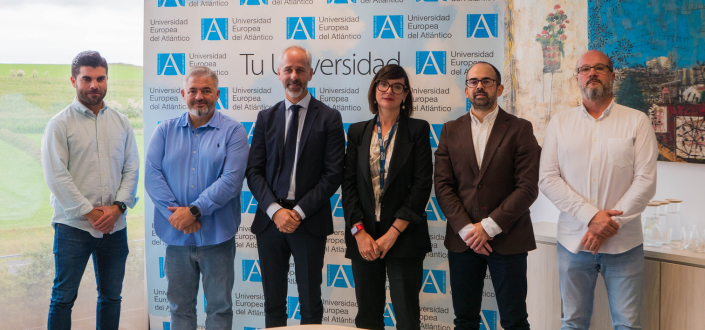UNEATLANTICO organizes together with the Ministry of Education and the Royal Cantabrian Football Federation the congress “Brain, Mind and Education”.
The Solidarity League of Vocational Training (FP) of Cantabria will start next Monday, September 16, with the neuroscience conference “Brain, Mind and Education”, in the Assembly Hall of the European University of the Atlantic (UNEATLANTICO). During this event, the positive effects of active methodologies, physical exercise and a balanced diet on cognitive and academic performance will be discussed.
Cristina Montés; the president of the Royal Cantabrian Football Federation, Mr. Ángel Peláez, and the vice-secretary general of UNEATLANTICO, Mr. Jesús Peña.
This indoor soccer league seeks to promote Sustainable Development Goals (SDGs), such as the eradication of hunger, health and well-being, and quality education.
The Minister of Education, Vocational Training and Universities, Mr. Sergio Silva, led the presentation, underlining the relevance and impact of this event, which in its third edition seeks to continue promoting sport. He also stressed that, after ten years since its inauguration, the European University of the Atlantic has established itself as an educational reference in Cantabria.
Next, Ms. Cristina Montés, General Director of Vocational Training and Continuing Education, explained how the league works, highlighting the values that will be worked on throughout the tournament. Ms. Montés also mentioned that around one thousand students from different vocational training cycles will participate, representing the following high schools: Augusto González Linares and Peñacastillo from Santander; Besaya, Miguel Herrero and Zapatón from Torrelavega; Fuente Fresnedo from Laredo; and Ataúlfo Argenta from Castro Urdiales.
For his part, the president of the Royal Cantabrian Football Federation, Mr. Ángel Peláez, pointed out that among the federation’s strategies is to collaborate in events that promote values and the Sustainable Development Goals (SDGs), as is the case of this league. In addition, Peláez expressed his satisfaction with the excellent relationship between the federation and UNEATLANTICO, stating that “the activities organized by the European University of the Atlantic are synonymous with success.”
The vice-secretary general of UNEATLANTICO, Mr. Jesús Peña, highlighted the importance of the university’s collaboration in this congress, given the relevance of the area of neuroscience in the university’s curricula, such as the degrees in Psychology and Primary Education, as well as the postgraduate programs in General Health Psychology and the Master’s Degree in Teacher Training for Compulsory Secondary Education and Baccalaureate, Vocational Training and Language Teaching. He also pointed out that the university has a laboratory of experimental psychology, neuropsychology and cognitive neuroscience, closely related to the topics to be addressed at the event.
In addition, the Minister of Education, Vocational Training and Universities, together with the Deputy Secretary General underlined the excellent relationship between the two institutions. As proof of this, they announced the signing of an agreement between UNEATLANTICO and the area of Vocational Training, which will allow the mutual recognition of studies between the VET and the university, as well as the recognition of credits. According to Peña, this agreement seeks to “expand, specialize and continue with the training of students, offering Cantabria and its young people the best possible education”.
Along these lines, UNEATLANTICO reaffirms its commitment to promoting quality education for the Cantabrian community. By supporting initiatives such as this one, the university not only seeks to continue strengthening its ties with local institutions, but also to actively contribute to the academic and formative development of young people in the region, offering opportunities that promote both personal and academic growth.


